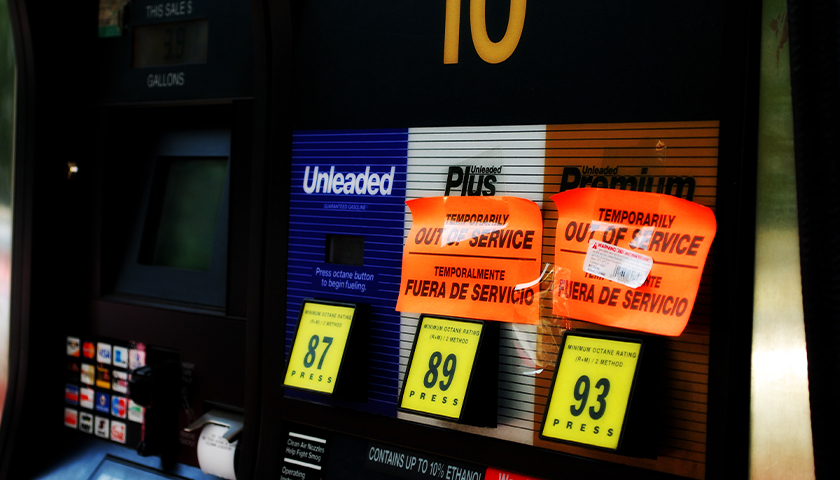by Casey Harper
Gas shortages on the East Coast have helped rally Congressional opposition to the portions of President Joe Biden’s infrastructure plan that would force oil and gas companies to pay more in taxes.
House Republicans sent a letter to House Speaker Nancy Pelosi, D-Calif., and House Majority Leader Steny Hoyer, D-Md., calling on Democrats to oppose Biden’s plan to “eliminate tax preferences for fossil fuels.”
The letter, signed by 55 Republicans, came after a cyber attack of Colonial Pipeline shut down a major pipeline on the East Coast and led to fear-driven gasoline shortages. The attack also raised questions about the nation’s energy infrastructure and vulnerability to attack.
“An infrastructure package should not include punitive tax provisions that would cripple a vitally important industry, lead to mass layoffs, skyrocketing energy costs for working families, higher prices at the gas pump, and give China and Russia the upper hand in a competitive global market,” read the letter, which was sent Thursday. “Policymakers should not be picking winners and losers, and if the oil and gas industry is truly the ‘loser’ that far left progressives want it to be, the market should decide.”
The letter marks the latest pushback against the tax law changes as Republicans use concerns over pipeline security this week to make their point.
“It’s one thing for policies to accelerate investment activity or production of certain products, but it is an entirely different matter to write laws that would punish a particular industry, especially one that is so fundamental to our economic growth and national security,” the letter read. “Using an ‘infrastructure’ package to weaken our energy infrastructure is a grave mistake that will hurt families, farmers, and small businesses still recovering from the pandemic.”
The oil and gas industry relies heavily on longstanding tax breaks from the federal government. Part of the debate on the issue centers around whether the federal help for oil and gas companies should be characterized as subsidies or tax deductions. Many on the left say the tax breaks are generous subsidies, especially given the companies’ profits and environmental concerns.
Many Republicans argue they are not subsidies but necessary deductions that are normal for businesses.
“The fossil fuel industry employs millions of Americans, predominantly in rural communities, while contributing more tax revenue than any other industry in the nation,” said Daniel Turner, founder of the energy workers advocacy group Power the Future. “Tax breaks and deductions for research, development, and capital improvements are not subsidies. The Biden administration purposely confuses the language because they know the truth does not advance their agenda.”
The cyber attack this week has helped rally support around a common talking point to push for preserving protections for the energy industry against Biden’s infrastructure plan, which raises taxes and favors the renewable energy industry.
“The Colonial Pipeline crisis shows that we need more American energy to fuel our economy, not less,” said House Minority Leader Kevin McCarthy, R-Calif.
Critics argue the repeal in subsidies could cost millions of jobs and weaken the nation’s energy infrastructure. They also point to the threat of shortages.
“The oil and gas sector supports 11 million high-paying manufacturing jobs,” Americans for Tax Reform said. “President Biden repeatedly talks about creating millions of high-paying manufacturing jobs. However, by pushing tax hikes on oil and gas taxpayers, Biden would be taking aim at 11 million existing high-paying manufacturing jobs. Biden should be focused on policies that will create more jobs, not proposals that threaten existing jobs.”
Biden met with six Republican senators on Thursday for bipartisan talks on infrastructure, but no deal has been struck.
“It was great to be back with so many of the colleagues who I served with in the Senate, and I am very optimistic that we can reach a reasonable agreement,” Biden said after the meeting. “We didn’t compromise on anything. What we did was, I laid out what I thought we should be doing, and how it should be paid for, and my colleagues in the Senate came back to me and said they’ll come back with a counteroffer of what they are prepared to do, and how to fund it, and then we’ll talk again next week.”
Biden’s infrastructure plan is estimated to cost roughly $2 trillion with increased corporate taxes and more aggressive auditing to help pay for it. Critics argue Biden’s proposed taxes will be passed down to consumers in the form of higher energy prices.
“Raising the taxes on fossil fuels raises the cost on everything,” Turner said. “It is a fallacy to think corporations will pay more in taxes. They will just pass those additional costs on to consumers. We already see skyrocketing prices in the cost of lumber. Food prices have gone up dramatically. And this is all because energy prices have gone up. Punishing the energy industry does nothing for the environment, does nothing to combat climate change, it only helps score cheap political points while inflicting more pain on the American people at a time that they have had quite enough government inflicted pain thrust upon them.”
– – –
Casey Harper is a Senior Reporter for the Washington, D.C. Bureau. He previously worked for The Daily Caller, The Hill, and Sinclair Broadcast Group. A graduate of Hillsdale College, Casey’s work has also appeared in Fox News, Fox Business, and USA Today. Harper contributes to The Center Square.
Photo “out of service gas pumps” by B Rosen CC 2.0.








